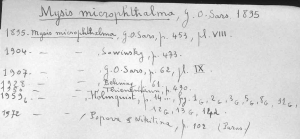WoRMS taxon details
Mysis microphthalma G.O. Sars, 1895
226706 (urn:lsid:marinespecies.org:taxname:226706)
accepted
Species
Sars, G. O. (1895). Crustacea Caspia. Account of the Mysidae in the collection of Dr. O. Grimm. <em>Bulletin de l'Academie Imperiale des Scences de St. Petersbourg.</em> ser. 5 (3): 433-458. (look up in IMIS) [details] 
Depth range 300-927m
Distribution "Limited to the deep water districts of the Caspian Sea, comparatively
common." In depths of 50 to 927 m.
Depth range 300-927m [details]
Distribution "Limited to the deep water districts of the Caspian Sea, comparatively
common." In depths of 50 to 927 m.
Distribution "Limited to the deep water districts of the Caspian Sea, comparatively
common." In depths of 50 to 927 m. [details]
common." In depths of 50 to 927 m. [details]
Mees, J.; Meland, K.; Väinölä, R. (Eds) (2012 onwards). World List of Lophogastrida, Stygiomysida and Mysida. Mysis microphthalma G.O. Sars, 1895. Accessed through: World Register of Marine Species at: https://www.marinespecies.org/aphia.php?p=taxdetails&id=226706 on 2025-05-17
Date
action
by
2006-05-10 15:31:07Z
created
db_admin
![]() The webpage text is licensed under a Creative Commons
Attribution 4.0 License
The webpage text is licensed under a Creative Commons
Attribution 4.0 License
Nomenclature
original description
Sars, G. O. (1895). Crustacea Caspia. Account of the Mysidae in the collection of Dr. O. Grimm. <em>Bulletin de l'Academie Imperiale des Scences de St. Petersbourg.</em> ser. 5 (3): 433-458. (look up in IMIS) [details] 
Other
additional source
Audzijonyte, A.; Damgaard, J.; Varvio, S.; Vainio, J. K.; Väinölä, R. (2005). Phylogeny of Mysis (Crustacea, Mysida): history of continental invasions inferred from molecular and morphological data. <em>Cladistics.</em> 21: 576-596. [details] Available for editors  [request]
[request]
additional source Derzhavin, A. N. (1939). Mizidy Kaspiya. Azerbaidzhanskii Filial Akademiya Nauk SSSR, Baku. [details] Available for editors [request]
[request]
additional source Väinölä, R. (1995). Origin and recent endemic divergence of a Caspian Mysis species flock with affinities to the "glacial relict" crustaceans in boreal lakes. <em>Evolution.</em> 49(6): 1215-1223. [details] Available for editors [request]
[request]
additional source Sars, G.O. (1907). Mysidae. <em>Trudy Kaspiiskoi Ekspeditsii 1904 goda.</em> 1: 243-313, pls. I-XII. M. P. Frolov, S-Peterburg. (look up in IMIS) [details]
additional source Daneliya, M. E.; Wittmann, K. J. (2021). Conservation of Continental Mysida and Stygiomysida. In: Rogers C.D; Kawai, T. (eds), Recent Advances in Freshwater Crustacean Biodiversity and Conservation (Crustacean Issues Vol. 20). <em>CRC Press.</em> p. 307-346., available online at https://doi.org/10.1201/9781003139560-10 [details] Available for editors [request]
[request]
additional source Müller, H. G. (1993). World catalogue and bibliography of the recent Mysidacea. 238p. [details] Available for editors [request]
[request]
additional source Derzhavin, A. N. (1939). Mizidy Kaspiya. Azerbaidzhanskii Filial Akademiya Nauk SSSR, Baku. [details] Available for editors
additional source Väinölä, R. (1995). Origin and recent endemic divergence of a Caspian Mysis species flock with affinities to the "glacial relict" crustaceans in boreal lakes. <em>Evolution.</em> 49(6): 1215-1223. [details] Available for editors
additional source Sars, G.O. (1907). Mysidae. <em>Trudy Kaspiiskoi Ekspeditsii 1904 goda.</em> 1: 243-313, pls. I-XII. M. P. Frolov, S-Peterburg. (look up in IMIS) [details]
additional source Daneliya, M. E.; Wittmann, K. J. (2021). Conservation of Continental Mysida and Stygiomysida. In: Rogers C.D; Kawai, T. (eds), Recent Advances in Freshwater Crustacean Biodiversity and Conservation (Crustacean Issues Vol. 20). <em>CRC Press.</em> p. 307-346., available online at https://doi.org/10.1201/9781003139560-10 [details] Available for editors
additional source Müller, H. G. (1993). World catalogue and bibliography of the recent Mysidacea. 238p. [details] Available for editors
 Present
Present  Present in aphia/obis/gbif/idigbio
Present in aphia/obis/gbif/idigbio  Inaccurate
Inaccurate  Introduced: alien
Introduced: alien  Containing type locality
Containing type locality
From editor or global species database
Depth range 300-927m [details]Distribution "Limited to the deep water districts of the Caspian Sea, comparatively
common." In depths of 50 to 927 m. [details]
Habitat bathypelagic [details]






